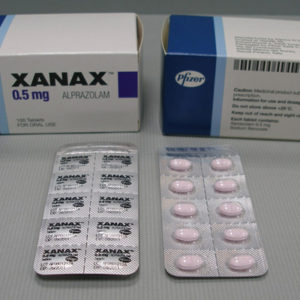Description
What is Bromazepam 6mg Roche?
Bromazepam 6mg Roche (marketed under several brand names, including Lectopam, Lexotan, Lexilium, Lexaurin, Brazepam, Rekotnil, Bromaze, Somalium and Lexotanil) is a benzodiazepine derivative drug, patented by Roche in 1963 and developed clinically in the 1970s. It is mainly an anti-anxiety agent with similar side effects to diazepam (Valium). In addition to being used to treat anxiety or panic states, bromazepam may be used as a premedicant prior to minor surgery. Bromazepam typically comes in doses of 3 mg and 6 mg tablets. Bromazepam is contraindicated and should be used with caution in women who are pregnant, the elderly, patients with a history of alcohol or other substance abuse disorders and children. Prolonged use of bromazepam causes tolerance and may lead to both physical and psychological dependence on the drug, and as a result, it is a medication which is controlled by international law.
Indications
Short-term treatment of anxiety or panic attacks, if a benzodiazepine is required.
Premedication to alleviate anxiety before surgery.
Side-effects
Lexotanil Bromazepam 6mg Roche is similar in side effects to other benzodiazepines. The most common side effects reported are drowsiness, sedation, ataxia, memory impairment, and dizziness. Impairments to memory functions are common with bromazepam and include a reduced working memory and reduced ability to process environmental information. A 1975 experiment on healthy, male college students exploring the effects of four different drugs on learning capacity observed that taking bromazepam alone at 6 mg 3 times daily for 2 weeks impaired learning capacities significantly. In combination with alcohol, impairments in learning capacity became even more pronounced. Various studies report impaired memory, visual information processing and sensory data and impaired psychomotor performance; deterioration of cognition including attention capacity and impaired co-ordinative skills; impaired reactive and attention performance, which can impair driving skills; drowsiness and decrease in libido. Unsteadiness after taking Bromazepam 6mg is, however, less pronounced than other benzodiazepines such as lorazepam.
On occasion, benzodiazepines can induce extreme alterations in memory such as anterograde amnesia and amnesic automatism, which may have medico-legal consequences. Such reactions occur usually only at the higher dose end of the prescribing spectrum.
Very rarely, dystonia can develop.
Up to 30% treated on a long-term basis develop a form of dependence, i.e. these patients cannot stop the medication without experiencing physical and/or psychological benzodiazepine withdrawal symptoms.
Leukopenia and liver-damage of the cholostatic type with or without jaundice (icterus) have additionally been seen; the original manufacturer Roche recommends regular laboratory examinations to be performed routinely.
Ambulatory patients should be warned that Lexotanil Bromazepam 6mg may impair the ability to drive vehicles and to operate machinery. The impairment is worsened by consumption of alcohol, because both act as central nervous system depressants. During the course of therapy, tolerance to the sedative effect usually develops.
Tolerance, dependence and withdrawal
Lexotanil Bromazepam 6mg Roche shares with other benzodiazepines the risk of abuse, misuse, psychological dependence or physical dependence. A withdrawal study demonstrated both psychological dependence and physical dependence on Bromazepam 6mg including marked rebound anxiety after 4 weeks chronic use. Those whose dose was gradually reduced experienced no withdrawal.
Patients treated with bromazepam for generalised anxiety disorder were found to experience withdrawal symptoms such as a worsening of anxiety, as well as the development of physical withdrawal symptoms when abruptly withdrawn bromazepam. Abrupt or over rapid withdrawal from Bromazepam 6mg after chronic use even at therapeutic prescribed doses can lead to a severe withdrawal syndrome including status epilepticus and a condition resembling delerium tremens.
Animal studies have shown that chronic administration of diazepam or Lexotanil Bromazepam 6mg-60tabs causes a decrease in spontaneous locomotor activity, decreased turnover of noradrenalineand dopamine and serotonin, increased activity of tyrosine hydroxylase and increased levels of the catecholamines. During withdrawal of bromazepam or diazepam a fall in tryptophan, serotonin levels occurs as part of the benzodiazepine withdrawal syndrome. Changes in the levels of these chemicals in the brain can cause headaches, anxiety, tension, depression, insomnia, restlessness, confusion, irritability, sweating, dysphoria, dizziness, derealization, depersonalization, numbness/tingling of extremities, hypersensitivity to light, sound, and smell, perceptual distortions, nausea, vomiting, diarrhea, appetite loss, hallucinations, deliriu




